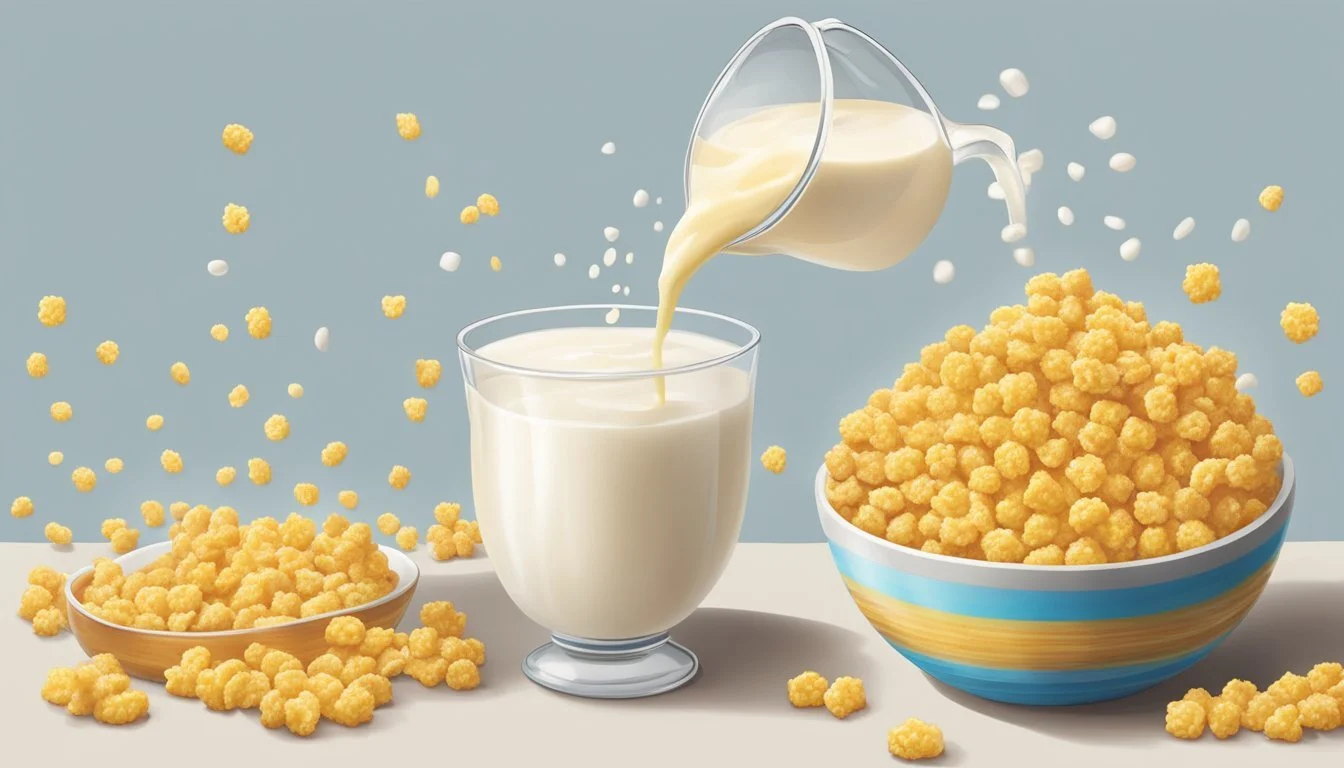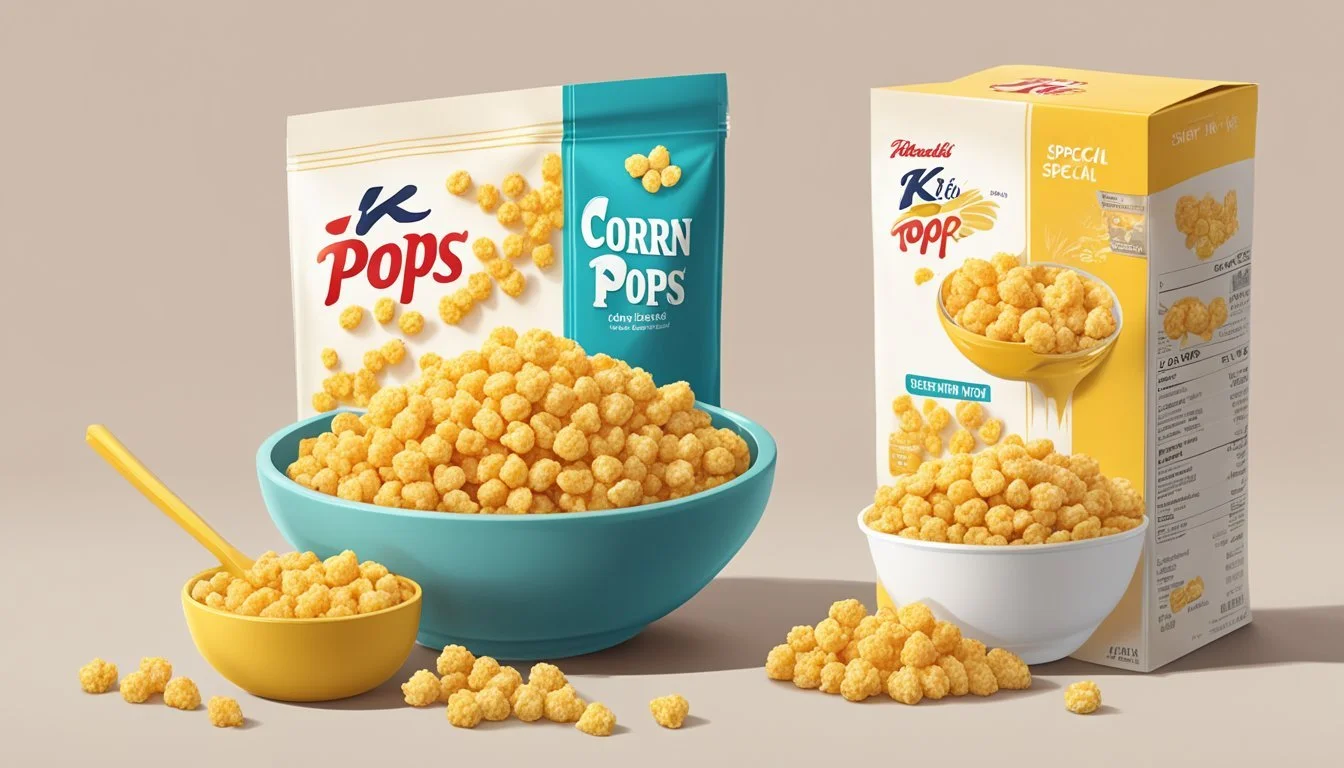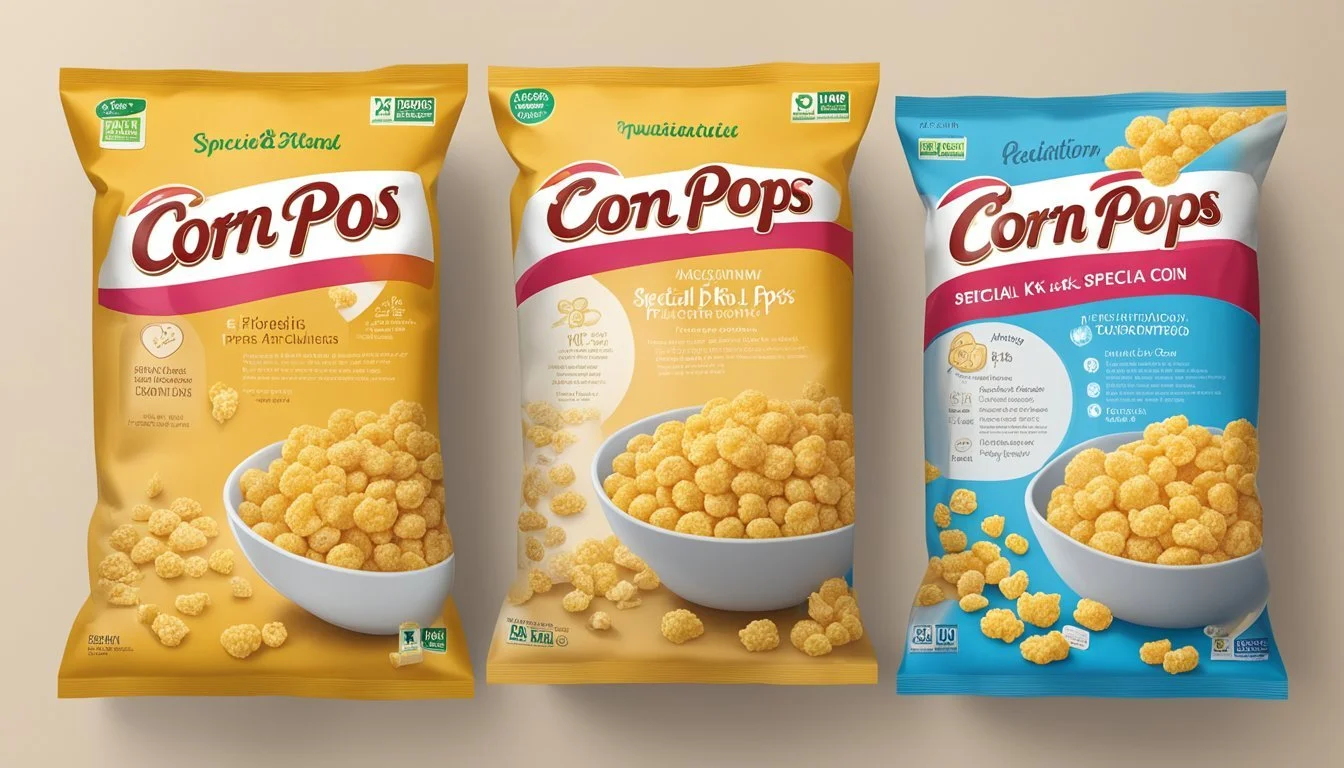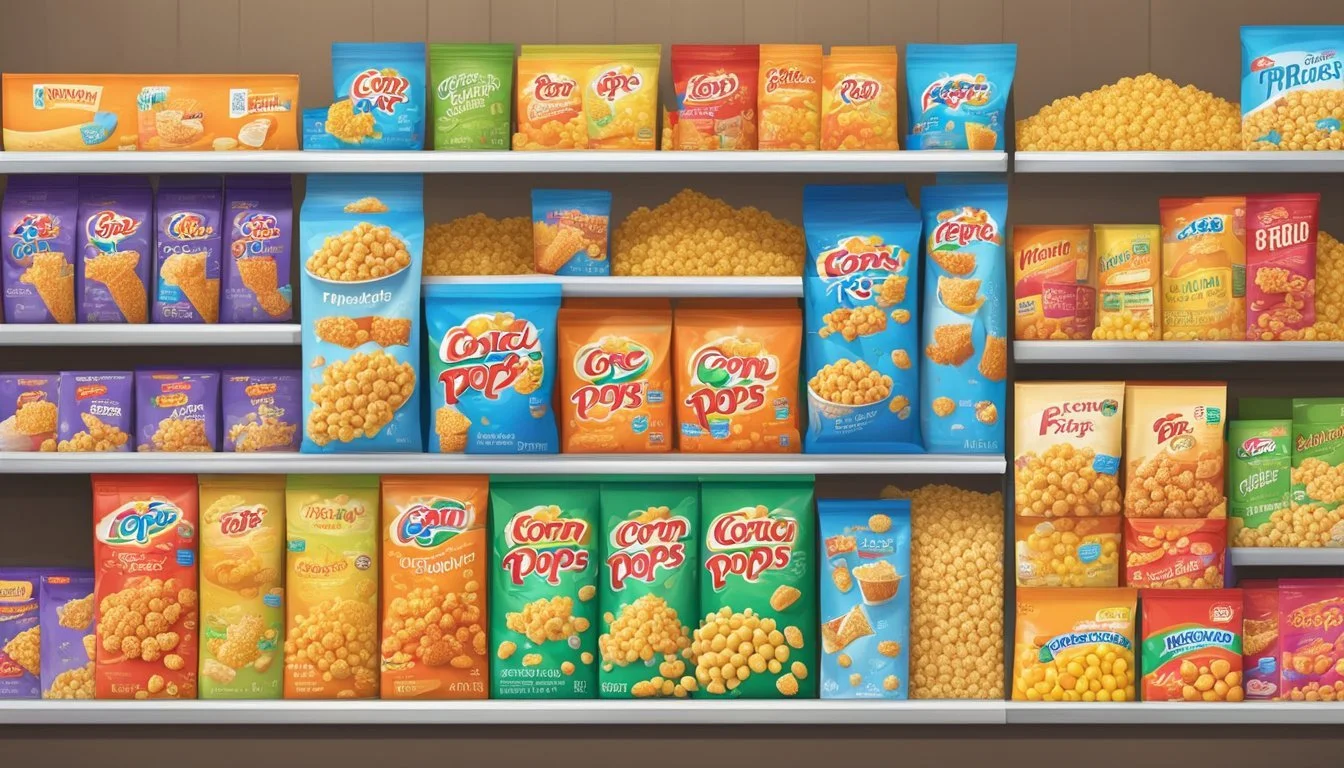Corn Pops vs Special K
Nutritional Comparison and Taste Test
This Article is Part of Our Breakfast Cereal Guide with Details on Corn Pops Nutrition and Special K Nutrition
When it comes to choosing between Corn Pops and Special K, it’s important to consider nutritional content. Special K offers more protein and fiber per serving compared to Corn Pops, making it a potentially better option for those focused on these nutrients. Corn Pops, on the other hand, contains higher levels of zinc, which can be beneficial for immune health.
Besides their nutritional differences, taste and texture play significant roles in the decision. Corn Pops provides a sweeter, crunchier experience, which might appeal more to those with a sweet tooth. Special K is known for its lighter, crisp texture and is often considered a more versatile cereal, suitable for various dietary preferences.
For those monitoring their sugar intake, Corn Pops contains a higher sugar content per serving than Special K. With these points in mind, the choice between Corn Pops and Special K ultimately depends on individual health goals and taste preferences.
Overview of Corn Pops and Special K
Corn Pops and Special K are well-known breakfast cereals that have been enjoyed by many for decades. Each has unique attributes and a distinct history that contribute to their popularity.
History of Corn Pops
Corn Pops, introduced by Kellogg's in 1950, have undergone several name changes throughout their history. Originally known as Sugar Pops, the cereal was designed to appeal to children with its sweet flavor.
In 1984, the name was changed to Corn Pops to reduce the emphasis on sugar. Throughout the years, marketing campaigns have targeted younger demographics, featuring animated characters and catchy slogans.
The cereal has a distinctive texture, being both crunchy and slightly soft, making it a favorite among kids and adults alike. Corn Pops are made primarily from milled corn, with added sugar and other flavorings.
They are fortified with vitamins and minerals, including a significant amount of zinc, which helps boost the nutritional profile despite the cereal's sweet taste.
History of Special K
Special K was launched by Kellogg's in 1955, targeting health-conscious consumers. Unlike many cereals of its time, it was marketed for its low-calorie content and high nutritional value. The focus was on weight management and overall health.
Initially, Special K was a simple flaked cereal made from rice and wheat. Over time, the brand expanded to include various flavors and forms, such as bars and shakes. The cereal's marketing often highlights its protein and fiber content, making it a popular choice for those looking to maintain a balanced diet.
Special K is also fortified with essential vitamins and minerals, with six times more Vitamin B12 compared to Corn Pops. This makes it a nutritionally dense option for breakfast.
Overall, Special K's evolution reflects changing consumer preferences towards health and fitness, ensuring it remains a staple in many households.
Nutritional Profiles
When comparing Kellogg's Corn Pops and Kellogg's Special K cereals, several nutritional aspects stand out. These include caloric content, macronutrient composition, and the variety and amounts of essential vitamins and minerals.
Caloric Content and Quality
Corn Pops and Special K offer different caloric values per serving. Corn Pops provides around 120 calories per 30-gram serving, while Special K comes in slightly lower at around 110 calories. This difference might be minimal for some, but it can be significant for those closely monitoring their caloric intake.
Quality of calories: Corn Pops tend to have higher sugar levels, contributing to their calories, which may not be ideal for health-conscious individuals. On the other hand, Special K contains fewer sugars and might include calories from more complex carbs and proteins that offer sustained energy.
Macronutrient Composition
Protein: Special K contains about 6 grams of protein per serving, which is comparatively higher than Corn Pops with only 1-2 grams. Protein aids in muscle repair and growth, making Special K more beneficial in this regard.
Carbs and Fiber: Both cereals are primarily carbohydrate sources. Special K has about 23 grams of carbs per serving, with 1 gram of fiber. Corn Pops have 26 grams of carbs but zero fiber, which is less desirable for those seeking digestive health benefits.
Fat and Sodium: Both cereals have nearly zero fat. Corn Pops contain 90 milligrams of sodium per serving, whereas Special K has a higher sodium content at around 230 milligrams. Lower sodium is generally preferred for heart health.
Mineral and Vitamin Content
Special K stands out in its vitamin and mineral profile. It offers essential nutrients like Vitamin B12, satisfying up to 600% of the daily requirement. Corn Pops, on the other hand, contain significantly more Zinc, about 5 mg compared to Special K's 0.69 mg.
Vitamins: Special K provides higher amounts of Vitamins B1 and B12, which are crucial for energy metabolism. Corn Pops do not have as enriched a vitamin content but deliver a noticeable amount of potassium.
Minerals: Special K includes iron, calcium, and Vitamin D, making it more comprehensive in terms of bone health and immune function. Corn Pops provide substantial amounts of Zinc and a bit of potassium, which are excellent for immune function and fluid balance.
Both cereals offer different nutritional benefits, catering to diverse dietary needs and preferences.
Health Impact
Corn Pops and Special K both offer unique aspects that may influence weight management, blood sugar regulation, and heart health.
Weight Management
Special K is often marketed as a healthy breakfast option that may aid in weight loss regimes. It contains 6 grams of protein per serving, contributing to satiety and reduced calorie intake throughout the day. Additionally, Special K generally has lower calorie counts, which could benefit those monitoring their calorie consumption.
Corn Pops, on the other hand, is less focused on weight management. While it has zero grams of fat per serving, the sugar content is higher compared to Special K. High sugar intake can counteract the benefits of low-fat content, making it less suitable for those aiming for weight loss.
Nutrient Density:
Cereal Protein (g) Fat (g) Sugar (g) Special K 6 0 Varies Corn Pops 2 0 High
Blood Sugar Regulation
The glycemic index of a food impacts blood sugar levels. Special K has a moderate glycemic index, which helps in maintaining stable blood glucose levels. This can be beneficial for those managing diabetes or looking to prevent blood sugar spikes.
Corn Pops, due to its high sugar content and lower fiber content, may cause rapid increases in blood sugar levels. This makes it a less favorable choice for individuals who need to regulate their blood sugar. The minimal fiber in Corn Pops further contributes to its high glycemic load, unlike Special K which may assimilate more slowly.
Glycemic Impact:
Special K: Moderate glycemic index.
Corn Pops: High glycemic index due to high sugar content.
Heart Health
Special K contains essential vitamins and minerals like Vitamin B12, but it is particularly noted for having low cholesterol and sodium content which are positive attributes for heart health. Its low-fat formula supports a diet that keeps blood cholesterol levels in check.
Corn Pops, while also low in fat, has a higher sodium content of 90 milligrams per serving compared to Special K’s 230 milligrams. High sodium intake is linked to increased blood pressure, which is a risk factor for heart disease. Therefore, despite its low fat, the sodium content in Corn Pops warrants consideration.
Heart Health Attributes:
Special K: Low fat, low cholesterol, moderate sodium.
Corn Pops: Low fat, higher sodium.
Special K’s lower sodium and cholesterol levels make it a more heart-friendly option compared to Corn Pops.
Ingredients and Additives
The ingredients and additives in Corn Pops and Special K significantly impact their nutritional value and overall healthiness. Key factors include the presence and type of whole grains, the amount and type of sugars, and the use of artificial flavors and preservatives.
Whole Grains and Processing
Corn Pops primarily uses milled corn as its base ingredient. The corn undergoes several processing steps, which can reduce its nutritional benefits. It’s not a significant source of whole grains.
Special K, on the other hand, often includes whole grains like rice and wheat. This provides more fiber and nutrients compared to processed grains, enhancing its overall nutritional profile. Whole grains contribute to better digestive health and have higher levels of vitamins and minerals.
Sugars and Sweeteners
Corn Pops contains a higher amount of added sugars, which is a concern for those monitoring their sugar intake. The sweeteners included are usually corn syrup and high fructose corn syrup, contributing to the cereal's sweet taste but not necessarily its health benefits.
Special K has relatively lower added sugar content. The sugars found in Special K are often less prominent, making it a slightly better choice for those looking to limit their intake of sugary foods. Nonetheless, it's essential to read the labels as formulas can change, and new versions may vary in sugar content.
Artificial Flavors and Preservatives
Corn Pops includes artificial flavors to enhance its taste. Ingredients like artificial vanilla flavor are common, which can be a point of concern for those seeking more natural food products. These additives don’t provide any nutritional benefits and are sometimes linked to health risks if consumed in large quantities.
Special K is generally marketed as a healthier option, often with fewer artificial ingredients. It tends to avoid a significant number of artificial flavors and preservatives, making it a better option for those looking to reduce their intake of synthetic additives. This commitment to fewer artificial additives aligns with the cereal’s health-focused branding.
Both cereals offer different benefits and drawbacks based on their ingredients and additives. It's crucial for consumers to read labels and understand what they are consuming, especially regarding whole grains, sugars, and artificial additives.
Consumer Experience
When comparing Corn Pops and Special K, the consumer experience differs significantly in terms of taste, texture, and versatility in preparation. These differences can affect how and when people choose to enjoy these cereals.
Taste and Texture
Special K has a lighter, crispier texture, making it ideal for those who prefer a delicate crunch. The flavor is mildly sweet, which appeals to individuals who enjoy a subtle taste that doesn't overpower their palate. Adding fruits such as strawberries or bananas can enhance the experience, offering a refreshing contrast to the cereal's mild flavor.
Corn Pops, on the other hand, provide a sweet and crunchy burst with each spoonful. The texture is firmer and holds up well in milk, maintaining its crunch longer than Special K. The inherent sweetness of Corn Pops often appeals to those with a sweet tooth, making it a satisfying option for both kids and adults.
Preparation and Versatility
Special K is highly versatile in preparation. It can be consumed with both warm or cold milk, allowing for different taste experiences based on preference. Additionally, its neutral flavor pairs well with a variety of fruits, nuts, and even yogurt, making it a flexible option for those seeking to mix and match ingredients for a balanced meal.
Corn Pops, though slightly less versatile, still offer enjoyable variations. Its sweet flavor is enhanced when paired with cold milk. Due to its inherent sweetness, it's less common to see Corn Pops mixed with fruits or other additives, as they might overshadow the cereal's distinct taste. Corn Pops are often enjoyed as a standalone snack, highlighting their unique, enjoyable crunch.
Market Considerations
Corn Pops and Special K cater to different demographics and have unique market presences in terms of product availability and varieties. These factors significantly impact consumer preferences and purchasing decisions, reflecting broader trends in the cereal market.
Demographic Preferences
Special K tends to appeal more to health-conscious individuals and women in particular. This cereal is often marketed for its nutritional benefits like low-fat content and the presence of essential vitamins and minerals.
On the other hand, Corn Pops attracts a younger audience, including children and teenagers. Its sweeter taste and colorful marketing have made it a popular choice for those seeking a more enjoyable, albeit less health-focused, breakfast option.
Diverse offerings such as Cheerios, Oatmeal, and Shredded Wheat often target adults seeking wholesome breakfast alternatives. Special K sits well within this category by promoting balance and health through fortified nutrition.
Product Availability and Varieties
Both cereals are widely available across major grocery stores, but their varieties differ significantly. Special K has expanded into numerous flavors and formulations, including Special K with Berries, Special K Protein, and Special K Red Berries. This extensive range enables the brand to cater to various dietary needs and preferences.
Corn Pops, in contrast, maintains a simpler product line. Its main offering remains consistent, focusing on the classic taste that has appealed to consumers for years. This consistent product presence makes it easily recognizable on store shelves.
Availability can also be seen in terms of packaging sizes. Special K usually offers multiple sizes, accommodating both single users and families. Corn Pops typically follow suit, ensuring that consumers have options that fit their consumption habits.
Brands like Life, Raisin Bran, and Rice Krispies also offer various product sizes and flavors to match different consumer needs, showing the importance of flexibility in the market.
Dietary Accommodations
Different dietary needs can influence your cereal choice. Here, the focus is on options for gluten-free diets and those seeking low-carb or high-fiber alternatives.
Gluten-Free Options
Kellogg's Corn Pops and Special K are not marketed as gluten-free. Corn Pops contain various ingredients, including corn, which may naturally be gluten-free, but they are processed in facilities that manage other gluten-containing grains, leading to potential cross-contamination.
Special K mainly uses rice and wheat, which are not safe for those with gluten intolerance or celiac disease. For truly gluten-free options, individuals should look at cereals specifically labeled and certified as gluten-free. This ensures they are free from any cross-contamination and meet the strict standards required for gluten-free certification.
Low-Carb and High-Fiber Alternatives
Special K is often considered a healthier option due to its lower sugar content and balanced nutrient profile. Special K has 3 grams of sugars per serving, making it a suitable choice for those on a low-carb diet.
Corn Pops, on the other hand, have 12 grams of sugars per serving, which is not ideal for low-carb diets. Neither cereal stands out as particularly high in dietary fiber, each offering just 1 gram per serving. Individuals seeking higher fiber content might want to look into cereals specifically formulated to have higher fiber levels or incorporate whole foods like fruits and grains into their diet.
Comparative Analysis
Corn Pops and Special K each have unique attributes that cater to different dietary needs. This section will examine their practical benefits related to weight loss and nutritional value.
Corn Pops Vs Special K for Weight Loss
When considering cereal options for weight loss, caloric content and sugar levels play crucial roles. Kellogg’s Corn Pops provides 120 calories per serving, while Special K comes in slightly lower at 110 calories.
Corn Pops has about 13g of complex carbohydrates per serving, compared to Special K's 16g. Lower carbohydrate content may benefit those on carbohydrate-restricted diets.
Special K contains 12g of sugar per serving, significantly higher than Corn Pops at 9g. High sugar intake can contribute to weight gain and counteract weight loss efforts.
Fiber content also affects weight management by promoting satiety. Neither Corn Pops nor Special K excels in fiber, but fiber-rich alternatives should be considered for those prioritizing weight management.
Overall Nutritional Value
Vitamins and minerals are vital in comparing nutritional value. Special K provides 600% more Vitamin B12, crucial for energy production and neurological health, than Corn Pops.
Zinc content distinguishes Corn Pops, offering 5mg per serving, significantly higher than Special K's 0.69mg. Zinc supports immune function and cell growth.
Evaluating protein is essential. Special K offers slightly more protein per serving, aiding muscle maintenance and hunger control.
Special K's versatility extends beyond breakfast; it can be used as a breadcrumb substitute or added to salads, diversifying its nutritional application. Corn Pops, while more limited in secondary uses, offers some baking applications.
Users should balance dietary needs and taste preferences when choosing between these cereals to achieve their nutritional goals.
Conclusion
When comparing Corn Pops and Special K, several nutritional factors come into play.
Special K offers a higher protein content, with 6 grams per serving compared to Corn Pops' lower protein amount. This makes Special K a better option for those looking to increase their protein intake.
Fiber is another key area where Special K excels, providing 3 grams per serving, while Corn Pops does not specify fiber content prominently. A diet higher in fiber is often recommended for better digestive health.
Complex carbohydrates are slightly higher in Special K, with 16 grams per serving versus Corn Pops' 13 grams.
Regarding sugar content, Special K includes 4.5 grams per 30g serving, while Corn Flakes contains 2.4 grams. For those monitoring sugar intake, the difference may be significant.
Vitamins and minerals vary between the two, with Special K providing substantially more Vitamin B12, meeting 600% of daily needs. Corn Pops, on the other hand, offers more Zinc per serving.
Calories and fat content in both cereals are relatively low, fitting well into calorie-conscious diets.
In summary, for individuals prioritizing higher protein and fiber, Special K presents a clear advantage. For others needing more Zinc or preferring lower sugar content, Corn Pops may be the preferred choice. Each cereal has distinct benefits depending on specific dietary needs.






